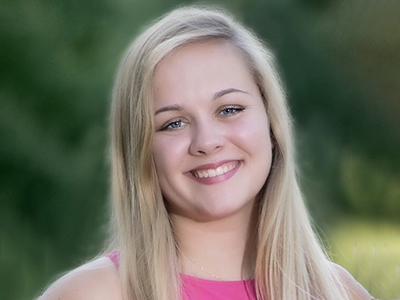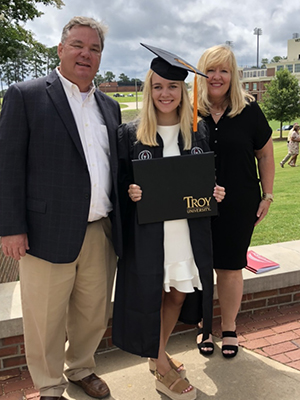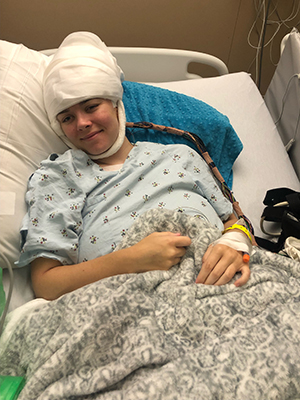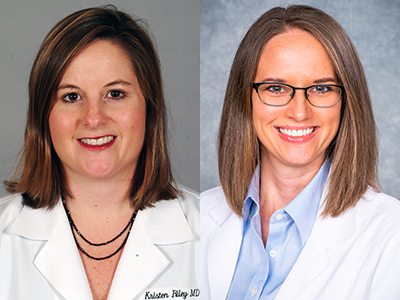
University of Alabama at Birmingham Department of Neurosurgery Professor Kristen Riley, M.D., and Assistant Professor Nicole Bentley, M.D., conduct the first radiofrequency ablation (RFA) procedure to treat epilepsy on Alabama native Ashley Williard.
Born in Birmingham, Ashley and her family moved to Selma, AL when she was eleven years old. Throughout her childhood, she enjoyed ballet, swimming, cheer, and tennis. She attended Troy University and earned her bachelor's degree in hospitality, sports, and tourism management.
Epilepsy diagnosis
Ashley's journey with epilepsy began early in life when the doctors identified her mother's negative platelet antigen while Ashley was in the womb. As a result, antibodies began attacking Ashley's platelets causing a brain bleed. She started experiencing balance issues around eighteen months old and was diagnosed with a cyst in close proximity to her brain stem soon after. A surgery to drain the cyst was required, and Ashley recovered a lot quicker than expected.
Soon after and through high school, she had infrequent generalized seizures and eventually began medications to control her seizures. She then experienced periodic small focal seizures and they increased to about twice a week in college.
Ashley was referred to UAB Epilepsy center and evaluated by Department of Neurology Associate Professor Zeenat Jaisani, MD.
Ashley consulted with Riley in March of 2021.
Treatment at UAB
A few months later, Ashley made the brave decision, alongside her care team led by Drs. Riley and Bentley, to proceed with the stereo-electroencephalography (SEEG), an exploratory surgery to determine the location of her seizures.
“They shaved my head, drilled holes, and placed electrodes directly in my brain to monitor and determine where the seizures were coming from,” said Ashley.

She was weaned off seizure medications and monitored in the hospital for nine days.
“Day eight was very hard for me until Dr. Riley came into my room to share the good news; I was a perfect candidate for the RFA procedure!” said Ashley.
Radiofrequency ablation is a minimally invasive procedure for drug-resistant focal epilepsy. RFA is commonly performed following identification of the seizure onset zone through SEEG.
Fortunately, one out of the fourteen electrodes identified exactly where the seizure activity was coming from. Dr. Riley explained to Ashley they would ablate this particular area and there was a fifty percent chance that she would walk away seizure-free.
After the ablation is completed, a follow-up MRI scan is obtained, the laser is removed, and the skull anchor bolt is removed. The patient is awakened in the MRI suite and then goes to the recovery room for a few hours before moving to overnight observation, prior to discharge the following day.
Life today
After her RFA procedure, Ashley has been seizure-free for over six months.
“I will be able to drive again next month, and I am more confident knowing that I can go places without having a seizure. My family and I have a strong faith and I consider my healing a true miracle. I prayed God would heal me, and He did. I am also thankful that I was introduced to another person during the hospital stay that had a similar experience to me. She was very supportive and was there when I needed someone to talk to. I actually gained a new friend.”
that I was introduced to another person during the hospital stay that had a similar experience to me. She was very supportive and was there when I needed someone to talk to. I actually gained a new friend.”
Ashley notes she is beyond grateful for the UAB medical team, staff, and clinicians who took care of her.